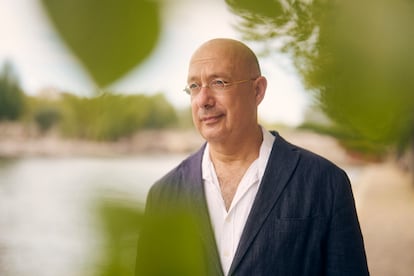Rob Riemen, essayist: ‘In this society you are constantly brainwashed with your success, and you end with an enormous internal emptiness’
The founder of Amsterdam’s Nexus Institute, dedicated to the interdisciplinary reflection, defends the need to rediscover some common universal values

Rob Riemen strongly believes in the benefits of learning poetry by heart. The important thing, he argues, is to cultivate the spirit and create independent individuals who think for themselves. This is one of the reasons why the Dutchman founded the Nexus Institute in Amsterdam almost three decades ago. The aim is to promote debate and keep the tradition of European humanism alive. In his new essay, Mens worden is een kunst (Becoming Human is an Art), the thinker goes one step further and proposes some keys to recovering the universal values that define us as human beings. Only then, he claims, will it be possible to defeat the rise of extremism. This scholar of the German Nobel Prize winner Thomas Mann talked with EL PAÍS at a restaurant in central Paris.
Question. On Nexus, former Canadian politician Michael Ignatieff once said: “This is the only gathering where on the same platform you can find an admiral and an opera singer.” Why is it important to listen to such different people?
Answer. I started Nexus when I was a student and I felt horrified by the intellectual limitations of the academic world which for a long time has had no connection whatsoever with the original idea and meaning of the universitas, the kind of knowledge the so-called universities are supposed to offer to students. The other thing I have real problems with is ideologies, as they stop any form of independent thinking and having a critical mind. The third argument is that I strongly believe there is truth, metaphysical truth, but nobody can claim to be in possession of the truth. The moment you make that claim, you are a fundamentalist.
Q. And that is what you criticize.
A. What I criticize is that [universities] ignore their original purpose, which is providing the education which Socrates provided, the spiritual formation of young people, the indispensable knowledge they need to become a human being. Cicero says it most beautifully in his Tusculan Disputations: “Cultura animi, philosophia est,” the cultivation of the human soul is the quest for wisdom. The whole book is based on the fundamental idea that we have to refind the meaning of words. It’s what Thomas Mann says, it is what [Robert] Musil says. We forgot what democracy is, what freedom is, what truth is.
Q. In what sense?
A. In general, we have replaced our quest for wisdom and quality with our obsession with quantity, numbers, what’s useful. Nowadays, influencers are those with the biggest numbers — but they have nothing to offer. I feel happy to be part of a generation whose influencers were the writers we admired: Thomas Mann, Gabriel García Marquez, Mario Vargas Llosa, Albert Camus…
Q. Do you think that current generations need to read or learn more about the past?
A. It begins with a lack of self-confidence. When you grow up in this very prosperous Western society, and you are constantly brainwashed with your success, or the person you are supposed to be, and all is based on what you have and not on what you are, you end up with an enormous internal emptiness. One of the reasons why I wrote Mens worden is een kunst is that it is a book about virtues. Its main aim is the empowerment of all those individuals, young people in particular, who are eager to refind the virtues and values necessary to realize the much-needed victory of democracy and defeat the growing totalitarian mindset.
Q. Didn’t the same thing happen with previous generations?
A. In a grand scheme, there was the phenomenon of religion. People grew up in a religion-based society. The second thing is that the big divide in western history was World War I. That’s why I start [the second study of my book] with that. Because WWI blew up everything they believed in. There was this faith in progress, science, moral education. There was this faith in Europe and in European culture. And when this war was over, they looked at a continent in ruins and everything was gone. How could this happen? [Robert] Musil wrote that every age needs a raison d’être. And he said: the empirical age has not found it yet. And Thomas Mann then takes [philosophers] Jan Patocka and Husserl very seriously; they say that the essence of the European identity is the care for the human soul and is based on individual capacity. And here is my criticism to the whole woke culture and those obsessions about identity issues.
Mass democracy is based on lies
Q. Why do you think this is so present? Doesn’t that prove that something wasn’t working?
A. The credo of European humanism is that the true identity of any human being, regardless of gender, social background or belief, is based on what we have in common. All human beings can live in truth, create beauty, do justice and have compassion. And this is our true identity.
Q. How did we lose it? Who is responsible?
A. We lost it with what [Friedrich] Nietzsche would call the death of God, what humanists would call the loss of transcendental values. It is us, all of us. People can deal with many things, but there is one thing no one can deal with and that is total emptiness. Nietzsche knew this. He knew that we would enter the age of nihilism, where there are no more values, but people are not able to cope with it. So they find their own substitutes.
Q. And how can we recover those values?
A. It takes courage to step out of the group, to not be afraid to be different. And it’s Nietzsche again, when he tells the students “don’t ask me.” You have to do it yourself.
Q. And if one is wrong?
A. There is a wonderful poem by Robert Frost: The Road Not Taken. Everybody uses the general road, but you have to take the other one. But to be able to do that, you need a certain education. You have to have this knowledge of the poets, the philosophers, the thinkers, the artists, the painters. They can help you overcome it. That’s why we have the world of culture, the arts, philosophy and humanities, because the main questions of life will never be answered by technology, science or money.
Q. How do you explain the success of the extreme right in so many countries?
A. The question is: why did fascism not disappear? It is a kind of cancer which will always be able to grow in a mass society, in a mass democracy. What is the difference between a mass democracy and a democracy? A democracy is based on spiritual moral values. It is something you have to strive for, which also means that democracy is the most elitist model of government there is. Because it demands of everybody to be responsible, to think as human beings, to be educated, to have the capacity to listen. A mass democracy, however, is the complete opposite of democracy. It is governed by fear and greed. It is based on the politics of lies, hatred and resentment, and so when you have a mass of people who are no longer independent thinking human beings but only just want to be part of the group, and who are dominated by their own fears and desires, they will become vulnerable to the demagogues.
Sign up for our weekly newsletter to get more English-language news coverage from EL PAÍS USA Edition
Tu suscripción se está usando en otro dispositivo
¿Quieres añadir otro usuario a tu suscripción?
Si continúas leyendo en este dispositivo, no se podrá leer en el otro.
FlechaTu suscripción se está usando en otro dispositivo y solo puedes acceder a EL PAÍS desde un dispositivo a la vez.
Si quieres compartir tu cuenta, cambia tu suscripción a la modalidad Premium, así podrás añadir otro usuario. Cada uno accederá con su propia cuenta de email, lo que os permitirá personalizar vuestra experiencia en EL PAÍS.
¿Tienes una suscripción de empresa? Accede aquí para contratar más cuentas.
En el caso de no saber quién está usando tu cuenta, te recomendamos cambiar tu contraseña aquí.
Si decides continuar compartiendo tu cuenta, este mensaje se mostrará en tu dispositivo y en el de la otra persona que está usando tu cuenta de forma indefinida, afectando a tu experiencia de lectura. Puedes consultar aquí los términos y condiciones de la suscripción digital.









































